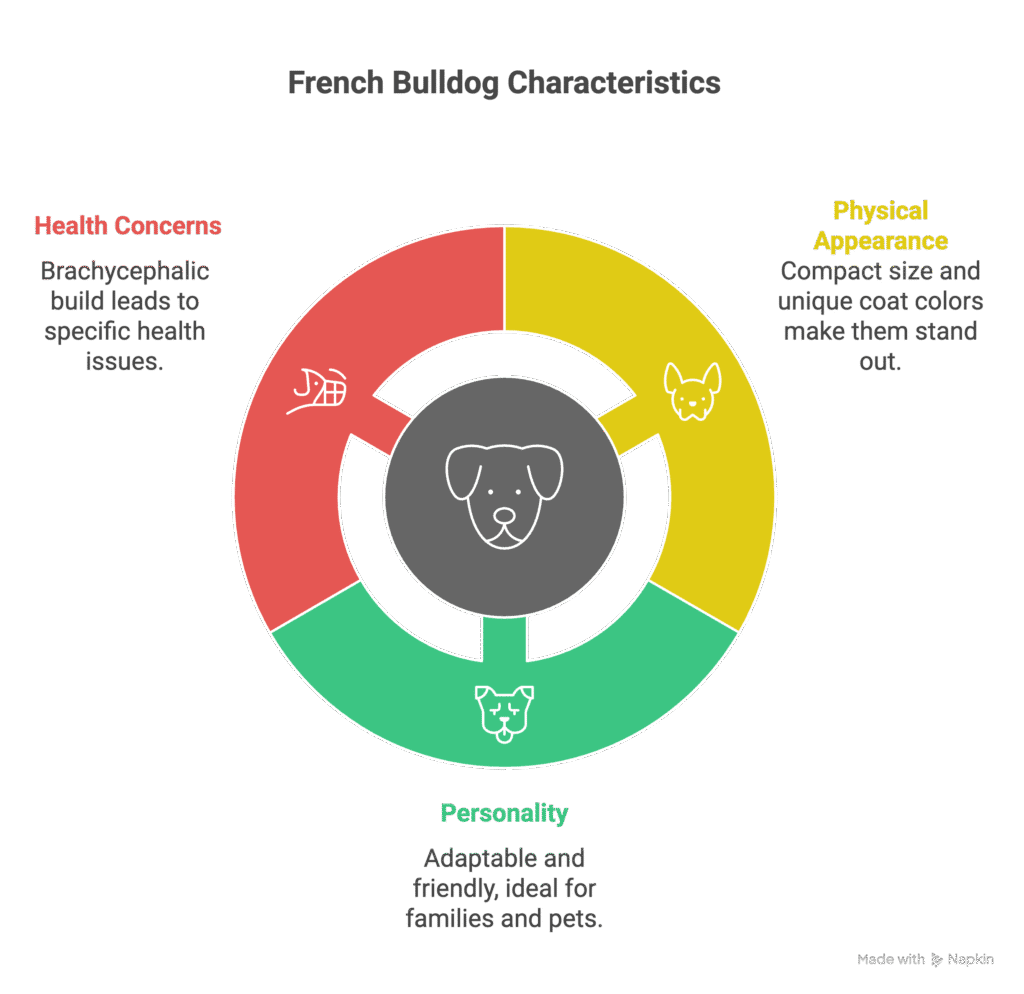French Bulldog Guide: Insights from the French Bull Dog Club and Bull Dog Club of America
French Bulldogs are more than just adorable pups with bat-like ears — they’re one of the world’s most popular dog breeds. Known for their affectionate temperament, compact size, and distinctive appearance, Frenchies have captured hearts worldwide. Whether you’re curious about the history of this companion breed, interested in the French Bull Dog Club or the Bull Dog Club of America, or simply considering adopting a French Bulldog puppy, this article has everything you need.
In this guide, you’ll discover the origins of the French Bulldog dog breed, training tips, potential health issues, and what pet parents should know before choosing this breed. By the end, you’ll understand why French Bulldogs also continue to be one of the most sought-after family dogs — and how to keep your pup healthy and happy.
Outline of This Article
Here’s what we’ll cover:
- What Makes the French Bulldog a Unique Breed?
- A Quick History of the Frenchie: From Toy Bulldogs to Today
- French Bulldog Temperament: Are They Good Family Dogs?
- Training Tips for French Bulldogs: Easy to Train or Stubborn?
- Common Health Issues in French Bulldogs: What Pet Parents Should Know
- Grooming and Proper Care: How to Keep Wrinkles, Skin, and Coat Healthy
- Nutrition and Exercise: Avoiding Obesity in Frenchies
- French Bulldog Puppies and Breeders: How to Choose the Right Fit
- French Bulldogs at the Dog Park: Socialization and Play Sessions
- Why French Bulldogs Make Loving Companions
- Key Takeaways: French Bulldogs in a Nutshell
What Makes the French Bulldog a Unique Breed?

The French Bulldog is instantly recognizable thanks to its compact size, bat-like ears, and short muzzle. This companion breed typically weighs under 28 pounds, making them ideal for apartment living. Their distinctive appearance sets them apart from other purebred dogs, with coats in various shades of brindle, fawn, cream, or pied.
What makes them truly special is their personality. French Bulldogs make excellent companion animals and are considered one of the best family dogs because they get along well with children and other pets. They’re adaptable, low-maintenance, and thrive when they’re part of a loving home.
On the other hand, due to their brachycephalic build, Frenchies face some challenges that pet parents need to understand. We’ll explore these later under health concerns.
A Quick History of the Frenchie: From Toy Bulldogs to Today
The French Bulldog’s story begins in 19th-century England, where smaller toy Bulldogs were bred as companion dogs. When lace workers migrated to France, they took these pups along, and over time, the crossbreed developed into what we now know as the French Bulldog.
By the late 1800s, Frenchies were a hit in Paris cafés and even appeared at the Westminster Kennel Club show in 1896. Interestingly, the breed’s lineage is connected to English Bulldogs, originally bred for bull-baiting, but later softened into affectionate, indoor-loving companions.
The AKC (American Kennel Club) eventually recognized the breed, and today, organizations like the French Bull Dog Club and the Bull Dog Club of America help preserve standards and promote breed health.

French Bulldog Temperament: Are They Good Family Dogs?
The French Bulldog temperament is one of the reasons the breed is so beloved. They’re playful, affectionate, and make loving companions. Unlike more independent dogs such as the Cocker Spaniel, Frenchies want to be near their humans at all times.
- They are known for separation anxiety if left alone too long.
- They thrive on daily walks and short play sessions.
- They’re excellent family dogs and often get along well with children.
- When choosing a breed, many families consider how well the dog integrates with household routines. French Bulldogs check nearly every box: they’re small, quiet, and incredibly loyal.
Training Tips for French Bulldogs: Easy to Train or Stubborn?
Are French Bulldogs easy to train? Yes and no. Frenchies are intelligent, but they can also be stubborn. A Frenchie’s desire for attention often works in your favor if you use positive reinforcement.
Training tips include:
- Keep sessions short and fun.
- Use treats and praise.
- Be consistent with commands.
- Socialize early to avoid shyness.
Because French Bulldogs are brachycephalic dogs, strenuous dog sports aren’t ideal. Instead, focus on obedience training, interactive toys, and structured play sessions. With patience, this purebred is absolutely easy to train.
Common Health Issues in French Bulldogs: What Pet Parents Should Know
Like all brachycephalic dogs, Frenchies face unique health challenges. Understanding these health concerns is key to giving them proper care.
Some potential health problems include:
- Brachycephalic airway syndrome (caused by a narrow soft palate)
- Patellar luxation (loose kneecaps)
- Hemivertebrae and intervertebral disc disease (spinal issues)
- Skin allergies and skin fold dermatitis (wrinkle infections)
- Ear infections due to their narrow ear canal
- Cleft palate in some puppies
Because of these various health issues associated with the breed, routine veterinary care is a must. Regular checkups help detect problems early, from skin fold irritation to bacterial infections in the ear canal.
Grooming and Proper Care: How to Keep Wrinkles, Skin, and Coat Healthy
French Bulldogs are average shedders, but grooming is relatively simple. The biggest task? Keeping their skin folds clean and dry. Trapped moisture can lead to skin fold dermatitis or bacterial infections.
- Wipe wrinkles daily to help them stay clean.
- Bathe every few months unless they get especially dirty.
- Brush weekly to maintain skin and coat health.
Their compact size makes them easier to handle during grooming than larger breeds like English Bulldogs. With the right care, your French Bulldog will remain healthy and happy.
Nutrition and Exercise: Avoiding Obesity in Frenchies
One of the biggest risks for French Bulldogs is becoming overweight. Since they’re prone to brachycephalic airway syndrome, carrying extra pounds makes breathing even harder.
To prevent this:
- Feed high-quality food designed for purebred dogs.
- Avoid overfeeding, even when those puppy eyes beg for more.
- Balance meals with short walks and play sessions.
- Watch for food-related skin allergies.
A healthy routine of getting enough exercise while avoiding extremes in hot or cold weather keeps Frenchies fit.
French Bulldog Puppies and Breeders: How to Choose the Right Fit
If you’re considering a French Bulldog puppy, the first step is finding a good breeder. Responsible bulldog breeders focus on breed health and proper socialization.
Tips for choosing wisely:
- Ask about health testing (especially for brachycephalic airway syndrome and spinal conditions).
- Meet the parents if possible.
- Ensure the pup was raised in a clean environment.
- Consider rescue groups if adoption appeals to you.
- Remember: not every breeder prioritizes proper care, so always do your research when choosing a breed source.
French Bulldogs at the Dog Park: Socialization and Play Sessions
A well-socialized French Bulldog is a joy to own. Taking your Frenchie to the dog park introduces them to new environments and helps prevent behavioral issues.
That said, remember:
- Because they are flat-faced, avoid strenuous exercise.
- Keep playtimes short and fun.
- Monitor interactions with larger dogs for safety.
These companion animals thrive on connection. Regular play sessions and gentle daily walks make them some of the most rewarding dogs to own.
Why French Bulldogs Make Loving Companions
French Bulldogs make fantastic pets because they embody the best of companion dogs: loyalty, playfulness, and adaptability. Their temperament makes them ideal family dogs, while their compact size suits modern living.
Sure, they come with health concerns, but with proper care, good food, and routine veterinary checkups, they can live long, fulfilling lives. If you’re drawn to their distinctive appearance and goofy charm, you’re not alone — Frenchies are one of the most popular dog breeds in the world.
Key Takeaways: French Bulldogs in a Nutshell
- The French Bulldog dog breed has a fascinating history, evolving from toy Bulldogs in England to beloved pets in Paris.
- Frenchies are a companion breed with a lovable temperament, great for children and other pets.
- They face various health challenges like patellar luxation, skin allergies, and brachycephalic airway syndrome, so veterinary care is essential.
- Grooming requires daily wrinkle cleaning and keeping skin folds clean and dry.
- Nutrition and exercise are crucial to avoid obesity and keep them healthy and happy.
- A good breeder or trusted rescue groups are the best sources for a French Bulldog puppy.
- Frenchies thrive with short walks, play sessions, and plenty of love.
- French Bulldogs may snore, fart, and occasionally test your patience — but they’re also some of the most loving companions you’ll ever meet.



